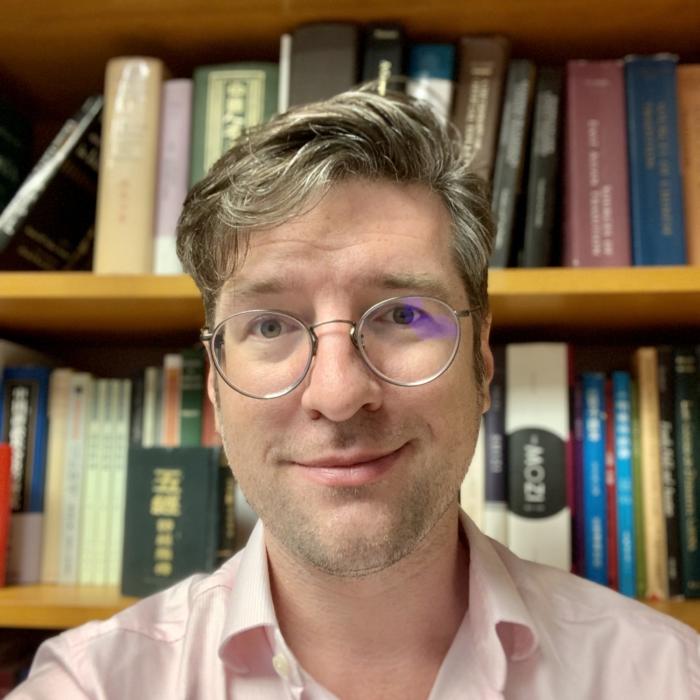Eric Schluessel

Eric Schluessel
Director, Sigur Center for Asian Studies; Associate Professor of History and International Affairs
Full-time Faculty
Department: History
Programs: MA Asian Studies
Contact:
Eric Schluessel is a social historian of China and Central Asia, and his work focuses on Xinjiang (East Turkestan) in the nineteenth and twentieth centuries. Land of Strangers, his first monograph, uses local archival and manuscript sources in Chinese and Chaghatay Turkic to explore the ramifications of a project undertaken in the last decades of the Qing empire to transform Xinjiang’s Turkic-speaking Muslims into Chinese-speaking Confucians. It won the 2021 John K. Fairbank Prize from the American Historical Association.
Schluessel is currently pursuing two research projects: Saints and Sojourners explores the economic history of the Uyghur region from the 1750s through the 1950s as seen from below, through the records of merchants, farmers, and managers of pious endowments. It ties changes at the village level to shifts in the global economy in places as far away as Manchester and Tianjin. Exiled Gods delves into Han Chinese settler culture and religion to illuminate the history of a diasporic community of demobilized soldiers and their descendants that spanned the Qing empire.
Thanks to grants from the National Endowment for the Humanities and the American Council of Learned Societies, Schluessel has also completed a translation and critical edition of the Tārīkh-i Ḥamīdī of Mullah Mūsa Sayrāmī, which is an important Chaghatay-language chronicle of nineteenth-century Xinjiang.
Schluessel previously taught at the University of Montana in Missoula and spent the 2018–2019 academic year at the Institute for Advanced Study in Princeton, NJ. Schluessel has also completed a translation and critical edition of the Tārīkh-i Ḥamīdī of Mullah Mūsa Sayrāmī, which is an important Chaghatay-language chronicle of nineteenth-century Xinjiang.
China, Central Asia, Xinjiang
John K. Fairbank Prize in East Asian History, 2021
Mellon Fellowship, Institute for Advanced Study, Princeton, NJ, 2018–19
National Endowment for the Humanities, Fellowship, 2019–20
Ph.D., Harvard University, 2016
M.A., Indiana University, 2007
M.A., School of Oriental and African Studies, 2005
B.A., Connecticut College, 2004
HIST 2001 China: Neolithic to Now (Fall 2022)
HIST 3611 History of Modern China (Fall 2020, Fall 2021, Fall 2022)
HIST 3601 Imperial China (Song–Qing) (Spring 2021, Spring 2023)
HIST 2605W Graverobbers on the Silk Road (Spring 2021)
HIST 3601 Uyghur History (Fall 2021, Spring 2024)
HIST 3601 China Civil War and Holy War (Spring 2022)
HIST 6611 Seminar: 20th-Century China (Spring 2023)
HIST 6601 Seminar: China Frontiers (Spring 2024)
Eric Schluessel, translator. The Tarikh-i Ḥamidi: A Late-Qing Uyghur History. New York: Columbia University Press, 2023.
Eric Schluessel, Aysima Mirsultan, and Eset Sulaiman, eds. Community Still Matters: Uyghur Culture and Society in Central Asian Context. Copenhagen: NIAS Press, 2022.
“Down and Out in Khandu and Qarakhoja: An Autobiography from Late Qing Turfan,” Journal of Central Asian History (forthcoming 2022).
“Making Truth in the Turpan Archive,” Quaderni Storici 56, no. 2 (2021), special thematic issue “Disassembling Colonial Archives,” 379–405.
“律与法 :晚清中国的两种法律空间,” 法律史译评 (2022), translated by 张一民. (Chinese translation of “The Law and the ‘Law’: Two Kinds of Legal Space in Late-Qing China.”)
“Anarkhan Before Anarkhan: The Pure Body of a Mao-Era Uyghur Saint” in Community Still Matters.
“Khotan iii. History in the Islamic Period” in Encyclopædia Iranica.
“Teaching Xinjiang in Chinese History,” The PRC History Review 6:4 (October 2021), 58–60.
“Islamic Law in Xinjiang” in Chiara Formichi, ed., Routledge Handbook of Islam in Asia (New York: Routledge, 2021), 125–37.
“Representation and the Misidentification of Economic and Ethnoreligious Conflict in Republican Xinjiang,” Asian Ethnicity (2020), DOI: 10.1080/14631369.2020.1789447
Land of Strangers: The Civilizing Project in Qing Central Asia (New York: Columbia University Press 2020).
“Exiled Gods: Territory, History, Empire, and a Hunanese Deity in Xinjiang,” Late Imperial China (June 2020).
“Water, Justice, and Local Government in Turn-of-the-Century Xinjiang,” Journal of the Economic and Social History of the Orient 62, no. 4 (December 2019): 595–621.
An Introduction to Chaghatay: A Graded Textbook for Reading Central Asian Sources (Ann Arbor: Maize Books, 2018).
“Hiding and Revealing Islamic Pious Endowments in Late-Qing Xinjiang,” The Muslim World 108, no. 4 (December 2018): 613–29.
(as 許臨君) “从城隍到戍卒:定湘王在新疆,” 历史人类学学刊 (重探「帝国」与「地方社会」 :华南研究与新清史的对话) (October 2017), 169–86.
With William Alford. “Legal History” in A Companion to Chinese History [Blackwell Companions to World History], edited by Michael Szonyi (Malden: Blackwell, 2017), 277–89.
“Muslims at the Yamen Gate: Translating Justice in Late-Qing Xinjiang” in Kashgar Revisited, edited by Ildikó Bellér-Hann, Birgit Schlyter, and Jun Sugawara, (Leiden: Brill, 2016), 116–38.
“The Law and the ‘Law’: Two Kinds of Legal Space in Late-Qing China,” Extrême-Orient Extrême-Occident 40 (November 2016): 39–58.
The World as Seen from Yarkand: Ghulām Muḥammad Khān’s 1920s Chronicle Mā Tīṭayniŋ wāqiʿasi. Tokyo: NIHU Program Islamic Area Studies, 2014.

